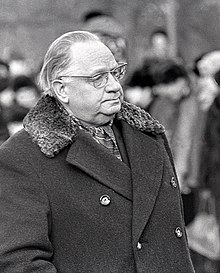Johannes Käbin
Johannes Käbin (born September 24, 1905 in the municipality of Rannu , then Virumaa district, † October 26, 1999 in Tallinn ) was an Estonian politician and communist .
Johannes Käbin was an ethnic and native-speaking Estonian. However, he spoke poor Estonian because he grew up in Russia . In 1910 his family had moved to Saint Petersburg and assimilated there . In 1923 Käbin became a Komsomolze and in 1927 he joined the Communist Party . He made a party career in Leningrad and Omsk and worked as a teacher in Moscow . After the Second World War , Käbin became deputy head of propaganda of the Central Committee of the Estonian Communist Party and director of the party's historical institute.
In 1950 he replaced Nikolai Karotamm as the leading communist in Estonia. Initially a strict Stalinist , Käbin was able to maintain his own position vis-à-vis Moscow with astonishing flexibility during his long time as party chairman.
He was chairman of the Communist Party of Estonia ( Eestimaa Kommunistlik Party ) from 1950 to 1978, at the same time from 1952 to 1978 a member of the Central Committee of the CPSU . In 1978 he was substituted for Karl Vaino, who was more loyal to Moscow, as party chairman. From 1978 to 1983 Käbin was chairman of the presidium of the Supreme Soviet of the Estonian SSR and thus in terms of protocol the highest position in the Union republic .
Johannes Käbin was a relatively moderate communist who nonetheless remained committed to consolidating Soviet rule in Estonia.
Publications
- Estonia yesterday and today . Progress Publishers, Moscow 1971
- The great October and Estonia . Perioodika, Tallinn 1976
- Estonia, one of the united family . Progress Publishers, Moscow 1985
| personal data | |
|---|---|
| SURNAME | Käbin, Johannes |
| ALTERNATIVE NAMES | Käbin, Ivan Gustawowitsch; Kebin, Ivan G. |
| BRIEF DESCRIPTION | Estonian communist |
| DATE OF BIRTH | September 24, 1905 |
| PLACE OF BIRTH | Rannu |
| DATE OF DEATH | October 26, 1999 |
| Place of death | Tallinn |
